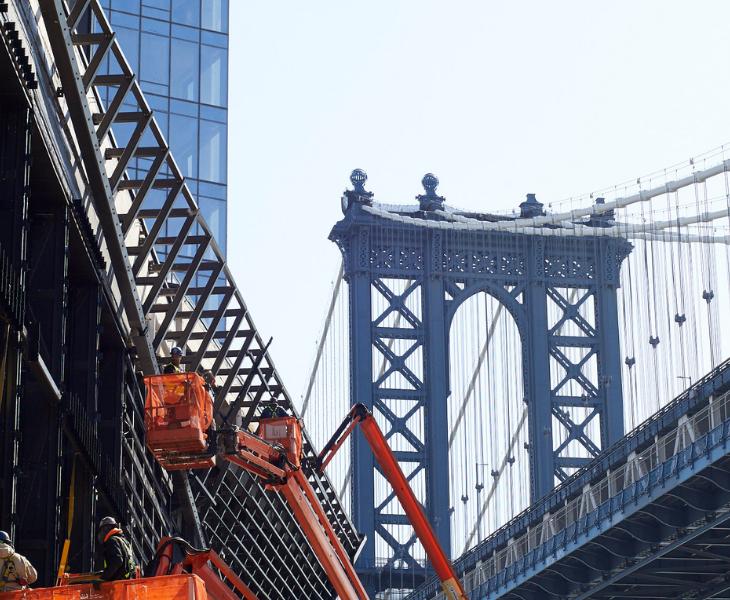Biden Calls for Unity, and a Field of Bridgebuilders Sees a Way Forward
March 2, 2022

For individuals and organizations that have spent the past four years working to build bridges across deep partisan divides, President Joe Biden’s State of the Union address last night offered both recognition and hope. Before a sharply divided nation and Congress, the President focused on issues that transcended political party and earned bipartisan applause: support for Ukraine, military veterans and cancer research; the need to increase mental health support and end the devastating opioid crisis.
“Let’s stop seeing each other as enemies and see each other for who we really are: fellow Americans,” Biden said. “We can’t change how divided we’ve been. But we can change how we move forward—on COVID-19 and other issues we must face together.”
The statement earned a standing ovation. It also infused energy into a network of people across the nation who have been thinking deeply, forging friendships, engaging in conversations and charting paths to bridge the national divide. They call themselves “bridgebuilders,” part of an emerging field that’s drawn enthusiasts across faith traditions, worldviews, political affiliation, and region – and appreciation from a bipartisan group in the U.S. Congress.
Four days before the State of the Union address, nine Democratic and nine Republican members of the U.S. House of Representatives introduced the Building Civic Bridges Act, aimed at assisting local civic and community organizations with ongoing efforts to address contentious issues and ultimately, bridge divides. The sponsors cited a January poll that found 70 percent of Americans believe the nation is so polarized that citizens can no longer tackle the major issues we face together.
What is Bridgebuilding?
Civic bridgebuilding: activities that foster respect between diverse communities, strengthen relationships across lines of difference, and forge a sense of common civic purpose, and which seeks to solve community problems and diminish polarization. This includes activities that take place in local communities, where individuals and institutions come together to build empathy, strengthen belonging, and address local issues; and activities at the field level, where civic bridgebuilding leaders work together to share research and best practices, learn from one another, and grow civic bridgebuilding efforts.
Those who have embraced bridgebuilding efforts acknowledge the work can be difficult. But advocates like scholar Simran Jeet Singh say the work is essential. Speaking with fellow bridgebuilders days after the January 6, 2021, attack on the U.S. Capitol, Singh compared the work to running a marathon.
“I had this moment of insight reading James Baldwin, he said this thing that completely changed my life. He said, ‘If I love you, I have to make you conscious of the things you don’t see.’ And to me, that’s the work of bridgebuilding,” Singh said. “I don’t do it because I hate people, and If I was doing it for that reason, I don’t think I’d last very long. I do it as an act of love for myself, and for my kids and for the people I’m trying to connect with, and then the bridge is entirely different and my relationship with it is entirely different.”
Resources for bridgebuilding:
- Bridging Differences Playbook (Greater Good Science Center) – IFYC is listed as a resource and the resource section (p. 43) lists many great bridgebuilding organizations that you could feel confident about
- The People’s Supper (co-founded by IFYC alumna Jen Bailey and Lennon Flowers) – we also feature it in our Interfaith Leadership 101: Act playlist on LRNG
- ListenFirst Project; there are now hundreds of bridging organizations and even several large associations that connect bridgebuilding organizations with one another
- #Interfaith curriculum – Bridgebuilding component of comprehensive online curriculum on engaging religious diversity online, created by IFYC in partnership with ReligionandPublicLife.org.
Public conversations that model bridgebuilding:
- We Commemorate, We Commit: Out of Catastrophe, a Conversation on Connection and Repair, a conversation reflecting on the 20th anniversary of the Sept. 11 attacks featuring Bilal, Valarie Kaur, John Inazu, Dr. Robert Klitzman, Eboo Patel and Sonal Shah.
- State of the Interfaith Nation: an IFYC series that centered diverse voices around the 2021 Inauguration, published January 6, 2021.
Read stories about bridgebuilding:
- Inspired by a Bridge-Builder, a ‘Third Culture Kid’ Finds Her Own Story
- Americans are Furious About Vaccinations. It’s Not Helping.
- Interfaith Campus Partnerships Are Building Bridges To Overcome Our Divisions
- Eight Keys to Bridging Our Differences
Share
Related Articles
American Civic Life
Faith Based Efforts Work in Vaccine Uptake: Now Let’s Make it Easy
American Civic Life
American Civic Life



